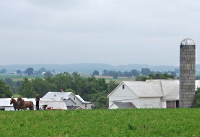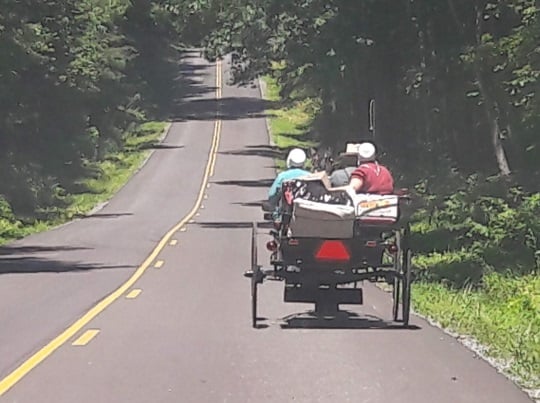An Amish bank for Lancaster County
“Amish-founded bank” may be a better way to describe the proposal to create a new bank in eastern Lancaster County. Lancaster New Era/Intelligencer Journal reports that operations at Bank of Bird-in-Hand could begin “in the next few months”. The heavily-Amish area is apparently underserved, and the investors see an opportunity there.
The article reports that a “substantial” number of the bank’s 18 investors are Amish. If you look at the last names of investors listed in the piece, potentially 14 of the 18 are Amish (or at least of Amish heritage) with a number of Fishers, Eshes and Millers in the bunch.

People sometimes wonder what Amish businesspeople do with their money. Besides buying land or reinvesting it in their companies, Amish may seek less traditional investment vehicles or business opportunities. Founding banks isn’t typical, but it is an activity with a precedent among the Amish.
Elmer Stoltzfus, who would be the chairman of the proposed bank, helped to found HomeTowne Heritage Bank in the late 1990s, later acquired by a larger institution. I am acquainted with Elmer Stoltzfus and know he has a good reputation for his business acumen in the community.
However I must say I was a little confused by this story, because I thought Lebanon Levi was in charge of all the Amish banking in Lancaster County. Hopefully Elmer and Co. cleared things with Levi. Would not want them appearing on a future episode of Levi’s show.
Amish farmland: UGArdener/flickr





I LOVE the name. It’s got to be the only bank in the world with a name like that. So much better than boring names like Bank of America, Merchants’ Bank, First National Bank of Witchita, etc etc.
I did not think of that until you mentioned it Forsythia. “Bird in Hand” would seem to really fit a bank with a conservative philosophy as it sounds like this one will be.
We have a message therapist here called “Heart in Hand” so this bank would fit right in. Maybe our new coffee shop could be “Cup in Hand!” I already see Amish on horseback coming back from the diner with cup in hand.
Kudos to the Amish for opening a new bank. It is extremely difficult to get a license to do so.
I have had my fill with big national banks. A few years back I was taken by nickle and dime. That is why now I utilize a local bank. I too, like that name.
Sorry for two consecutive post but I have a question. If this bank does have Amish investors, I wonder how they reconcile the issue with the FDIC, or perhaps it would not be an issue. I mean this in the manner of directly being connected to the US Government by having to provide a Federal insurance to the customers.
Amish bank insurance
If I understand what you are asking I seriously doubt there could be an exemption from insurance participation that placed public customers at risk just due to the religious status or objections of the ownership. So I’d assume all insurance requirements would be fulfilled here unless there is another arrangement (note I am not well-versed in banking).
Looking at it from the consumer side…funny, I hadn’t thought about this type of insurance before in an Amish context but you’d assume Amish bank customers like any other would benefit from deposit insurance just by having an account in a bank or credit union (which I understand are covered under a credit union-administered program). Have not heard any objections to that arrangement from Amish before and it’s safe to say near 100% of Amish households have at least a checking account.
There are Amish-run trusts for Amish only that remain outside of Federal deposit insurance, but Bank of B-I-H sounds like a “regular bank” open to the public:
http://online.wsj.com/article/SB124640811360577075.html
The trust was established in 1993, and is similar to lending arrangements set up in other Amish communities. Only Amish people can join. The trust’s 2,100 depositors receive annual interest of 3.2%, while borrowers pay 3.5% interest on loans. There are no credit checks. Monthly mortgage payments can be no more than 33% of a borrower’s gross income.
The trust’s structure reflects the Amish philosophy of sharing. It isn’t insured by the Federal Deposit Insurance Corp., but by its own bylaws it maintains at least $1 million in cash reserves. The trust has never exercised its authority to foreclose on a home.
Thanks for the reply Erik, and yes you answered the question very well. My apologies for the wording, I should have read over the question before posting, as it could have used some revision in order to be more clear and precise.
Sure Tom, I’m sure someone more knowledgeable about banking could give some more meat to that answer.
it´s against the old Amish values
The old Amish order is saying that the (Amish) believers should not give their money under the wings of worldly institutions. A Bank is “the” wordly institution par excellence, because it operates to make profit, and supports greediness und miserliness. The only real “Christian” loan is a loan without interest for an unlimited period of time.
Not all banks exist to make a profit
Hans, I understand the concerns about “worldliness”, but not all banks exist to make a profit. In America and Europe there’s a long tradition of mutually owned savings banks, savings & loan societies, and credit unions, none of which exist to make a profit.
Looking outside the Christian community, the Jews have a tradition of Free Loan Societies that continue to this day, and there is also sharia-complaint Islamic banking which does not charge interest to participants yet still manages to finance homes.
Of course, profitable corporate-owned banks seem to be quite successful and prolific as well.
I find it interesting how many ways there are to provide a the same basic service – banking.
Biblical views on money lending
I wonder if they will charge their customers interest on loans? Scripture is pretty clear on this issue.
It confused me a bit too, Eric! I am hopeful that Levi and his posse won’t give Elmer a hard time…I mean Levi DID say he was the bank…right??
Darlene technically one of the other characters said as much, but yes, Levi is supposed to be the bank from what I understood…guess I couldn’t resist 😉
Funny/Not funny, SHOM forgetting point, grasping
[Serious question] Will they hire Amish tellers and clerks?
[Joke statement] There has to be nothing worse than the potential of an Amish beginning a transaction speaking in dialect only to have an English woman decked out in plain wear (for example, it could be a man in the male equivalent) at the teller’s window only to be requested forcibly “What? Speak English! I’m not French.”
You can see how that would be a disaster.
[Serious statement, again, potential rumor spoiler, though] There is a European style food store that opened locally that had required successful candidates to be able to speak one of the languages of various countries represented in the store, representing their ethnic specific food. Interestingly they could not pull it off their own requirement and they began to hire people who are English only.
If the market can bare it I suppose is what I’m driving at. [sorry, I got stuck at the end, and couldn’t find the right way to end it, still can’t].
The general rule is if it needs university training, highly unlikely. Some Amish have taken limited higher level courses to be able to perform or get certification for certain professional jobs however.
This is great news, and very exciting. From what we’ve heard on this blog, there have been occasional financial charlatans preying on the Amish community (and once in a while the scammer is a fellow Amish). Having a regular bank might help the Amish have a safe place to keep their savings, and might help the entire community by financing local projects.
It would be interesting to know a bit more about how the bank is legally structured. From what I understand, there are a lot of different ways a bank can be legally structured: state-chartered vs. federally-chartered, mutually-owned savings banks, credit unions, corporate ownership. I wonder if the founders’ Amish faith influenced how they chose to structure the bank, or if there were other considerations.
Would it be beneficial?
My take on the Lancaster bank would not
make sense in the old order Amish, there is
too many worldly things within the business
side of bank.
I believe in the old order ‘Ordung’, there again
I would agree; there is a serious world greed
that go against this by all means. The love
and greed of this bird in the hand bank will
open the Amish to follow more modernized
Technology: such as going to a regular doctor,
to drive a car, accept electricity, do I need to
go any further?
I believe old order because the English
will have thier 2 cents involved in all decision
making regard the Lankaster bank.
Wunderbar icht miche mauken Kline sie
Sonderspiele kaput, nichte meire!
good luck Lancaster Bank bird in hand.
Art
Art, I’m curious, how many of Old Order Amish would you say use a bank now? And for those who don’t, how do they handle their money — keep savings under a mattress and pay cash for everything?
Your point on money inspiring greed is well taken. But in terms of hte ordnung, would patronizing a bank that uses electricity and computers be any different than patronizing a store which does the same?
I would think that a bank would be a safe place to keep money, and that for some large trasactions, like buying a house or farm, using a bank is almost essential – I can’t imagine someone lugging around bales of cash to pay $500,000 for a farm, for instance.
Ed, some very good points made
Dear Ed,
Sorry to take so long to answer and you talked
about some good point. I do perfectly understand
about a bank for the Amish would help a great
deal, I was only looking out for the best interest
for all Amish/Mennonites; I respect them a great
deal! I now have a serious issue with my local
Law enforcement where I live here in TN. I hope
you understand my concerns were for very good
Intentions.
I’m considering to move to Lancaster, PA because
local laws are not only protecting the Amish here,
I have a friend who is “English” he tells me;
They are doing the same thing to the “English”
This comes to a serious disappointment as you
Know we don’t like to get involved with Law Enforcement?
I recently had my property vandalized by someone
and I just enquired by a friend whom works
in local police: he tells me nothing I can do,
Also I almost got run over retrieving my mail
in small residential community that has a speed limit
Of 35; they were going over 55 mph, I even had
A witness, the law friend says I can’t do anything?
It sad these days people can’t live in peace?
So, my point is this: if best interests exsists for
Amish to get a bank, then Im all in for that and,
As long as its strictly run by Amish. I just wanted
to shed light on my best interests?
Wish much success for Bird In Hand Bank
Best regards,
Art
amabeejr@gmail.com